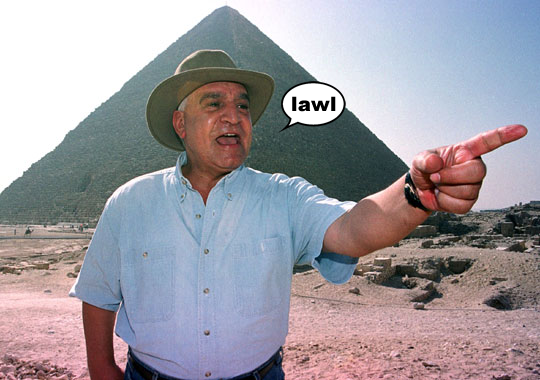Zahi Hawass was reappointed Minister of Antiquities today. Interim Prime Minister Essam Sharaf had agreed to demands from ministry employees that Antiquities remain separate from the Culture Ministry. Faced with an aimless department with a power vacuum at the top, continuing thefts at archaeological sites generating a great deal of concern and UNESCO attention, plus a world-famous archaeological power player on the loose, he asked Hawass to return. He, of course, accepted.
Mr. Hawass, who has never been accused of being humble, said on Wednesday that he did not ask to come back, but that there was no one else who could do the job. “I cannot live without antiquities, and antiquities cannot live without me,” he said.
Pardon my rolling eyes. Anyway, he returns to the mess he left, and then some. Ministry inventories of the damage and theft from museums and ancient sites released two weeks ago of the losses from the Cairo Museum and the Tel El-Faraein storehouse found 81 artifacts missing, including four gilded statues of Tutankhamun.
A UNESCO delegate visited Egypt last week to see for himself the situation on the ground and to produce a thorough list of what’s gone missing so it can be published worldwide in an attempt to preempt stolen artifacts from turning up in antique stores and auctions. Some officials were made uneasy by the visit, thinking it smacked a little too much of foreigners coming to Egypt to show the hapless natives how to manage their cultural patrimony. Others were glad to have UNESCO’s help.
From both perspectives, Hawass’ return is an advantage. In fact, I wouldn’t be surprised if it’s what spurred his reappointment.
“What we need now is the quick appointment of an antiquities leader,” Abdel Maqsoud [director of the central administration for antiquities in Alexandria and Lower Egypt] pointed out. To date, he says, no one knows who will meet with the UNESCO delegate. “It could be an archaeological team from the ministry of antiquities affairs or the Prime Minister Essam Sharaf or both – nobody knows yet,” confirmed Abdel Maqsoud.
On his part, Zahi Hawass, former minister of antiquity affairs said that he was requested by the assistant director general for culture, Franceso Bandarin to meet the UNESCO delegate. Hawass said that he will discuss with the delegate the recent status of Egypt’s antiquities and the amount of break-ins and loss, as well as the means to restituate [sic] such objects in the case they were smuggled out of the country.
He made clear that on several other occasions he rejected offers from UNESCO and other international organisations help to protect Egypt’s antiquities, calling the interference of any foreign country in the protection of Egypt’s heritage “antiquities colonisation.”
A top official in the ministry who requests anonymity told Ahram Online that Hawass cannot meet UNESCO delegate officially as he is no longer the antiquities minister, although he can meet the delegate as a professional archaeological expert in order to provide suggestions, the same as the former general director of the Supreme Council of Antiquities Gaballa Ali Gaballa or any other archaeological expert.
That was Monday, March 21st. A week and a half later and here we are.
